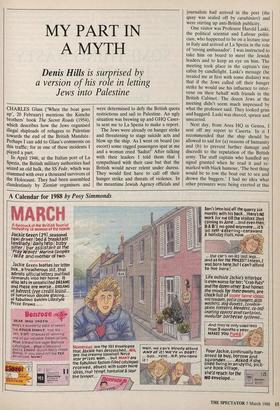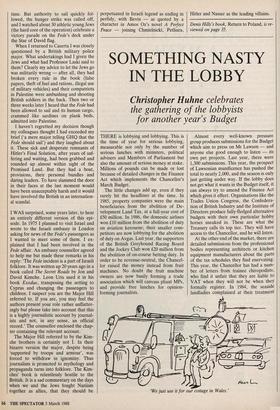MY PART IN A MYTH
Denis Hills is surprised by
a version of his role in letting Jews into Palestine
CHARLES Glass ('When the boat goes up', 20 February) mentions the Kimche brothers' book The Secret Roads (1954), which describes how the Jews organised illegal shiploads of refugees to Palestine towards the end of the British Mandate. Perhaps I can add to Glass's comments on this traffic; for in one of these incidents I played a part. In April 1946, at the Italian port of La Spezia, the British military authorities had seized an old hulk, the SS Fede, which was crammed with over a thousand survivors of the Holocaust. They had been assembled clandestinely by Zionist' organisers and were determined to defy the British quota restrictions and sail to Palestine. An ugly situation was brewing up and GHQ Caser- ta sent me to La Spezia to make a report.
The Jews were already on hunger strike and threatening to stage suicide acts and blow up the ship. As I went on board (no escort) some ragged passengers spat at me and a woman cried 'Sadist!' After talking with their leaders I told them that I sympathised with their case but that the British would never relent under duress. They would first have to call off their hunger strike and threats of violence. In the meantime Jewish Agency officials and journalists had arrived in the port (the quay was sealed off by carabinieri) and were stirring up anti-British publicity.
One visitor was Professor Harold Laski, the political scientist and Labour politi- cian, who happened to be on a lecture tour in Italy and arrived at La Spezia in the role of 'roving ambassador'. I was instructed to take him on board to meet the Jewish leaders and to keep an eye on him. The meeting took place in the captain's tiny cabin by candlelight. Laski's message (he treated me at first with some disdain) was that if the Jews called off their hunger strike he would use his influence to inter- vene on their behalf with friends in the British Cabinet. The dozen Jews at the meeting didn't seem much impressed by what the professor said. They looked grim and haggard. Laski was shaved, spruce and unscarred.
Next day, from Area HQ in Genoa, I sent off my report to Caserta. In it I recommended that the ship should be allowed to sail for (a) reasons of humanity and (b) to prevent further damage and discredit to the reputation of the British army. The staff captain who handled my signal grunted when he read it and re- marked with black humour, 'The best thing would be to tow the boat out to sea and drown the buggers.' I had no idea what other pressures were being exerted at this time. But authority to sail quickly fol- lowed, the hunger strike was called off, and I watched about 30 athletic young Jews (the hard core of the operation) celebrate a victory parade on the Fede's deck under the Star of David flag.
When I returned to Caserta I was closely questioned by a British military police major. What undertakings had I given the Jews and what had Professor Laski said to them? Clearly my advice to let the Jews go was militarily wrong — after all, they had broken every rule in the book (false papers, theft of fuel and rations, illegal use of military vehicles) and their compatriots in Palestine were ambushing and shooting British soldiers in the back. Then two or three weeks later I heard that the Fede had been allowed to sail and its human cargo, crammed like sardines on plank beds, admitted into Palestine.
I haven't regretted my decision though my colleagues thought I had exceeded my brief Ca mere major telling GHQ that the Fede should sail') and they laughed about it. These sick and desperate remnants of Hitler's Final Solution, after years of suf- fering and waiting, had been grabbed and rounded up almost within sight of the Promised Land. But they had a boat, provisions, their personal bundles and daring leaders. To have slammed the door in their faces at the last moment would have been unacceptably harsh and it would have involved the British in an internation- al scandal.
I WAS surprised, some years later, to hear an entirely different version of this epi- sode. In 1975 I planned to visit Israel and wrote to the Israeli embassy in London asking for news of the Fede's passengers as I wanted to meet some of them. I ex- plained that I had been involved in the Fede affair. An embassy counsellor agreed to help me but made these remarks in his reply: 'The Fede incident is a part of Israeli folklore. It was written up 20 years ago in a book called The Secret Roads by Jon and David Kimche. Leon Uris used it in his book Exodus, transposing the setting to Cyprus and changing the passengers to children. I suspect you are the Major Hill referred to. If you are, you may feel the authors present your role rather unflatter- ingly but please take into account that this is a highly journalistic account by journal- ists and not, in any sense, an official record.' The counsellor enclosed the chap- ter containing the relevant account.
The Major Hill referred to by the Kim- che brothers is certainly not I. In their bizarre version the major, despite being `supported by troops and armour', was forced to withdraw in ignominy. Thus journalism is promoted to mythology and propaganda turns into folklore. The Kim- ches' book is relentlessly hostile to the British. It is a sad commentary on the days when we and the Jews fought Naziism together as allies, that they should be perpetuated in Israeli legend as ending in perfidy, with Bevin — as quoted by a character in Amos Oz's novel A Perfect Peace — joining Chmielnicki, Petliura, Hitler and Nasser as the leading villains.
Denis Hills's book, Return to Poland, is re- viewed on page 35.



















































 Previous page
Previous page